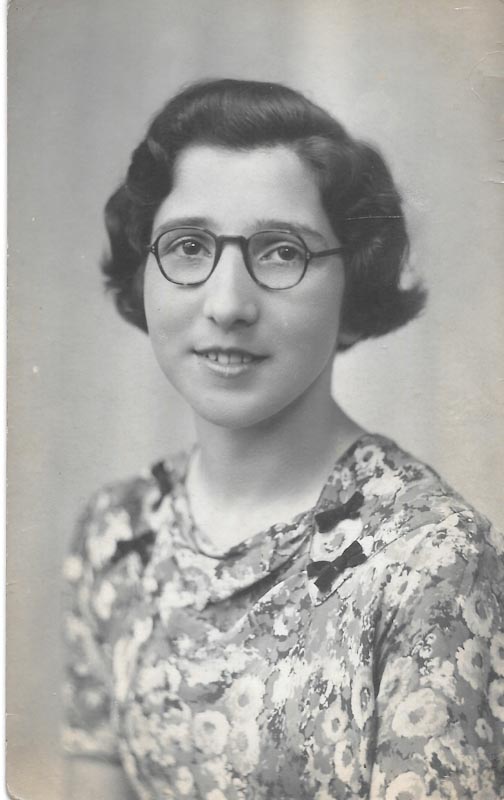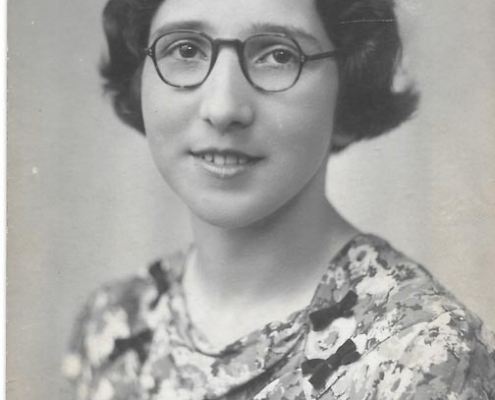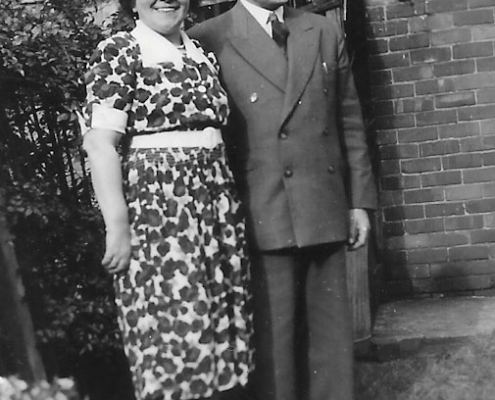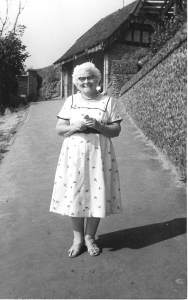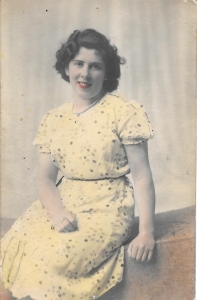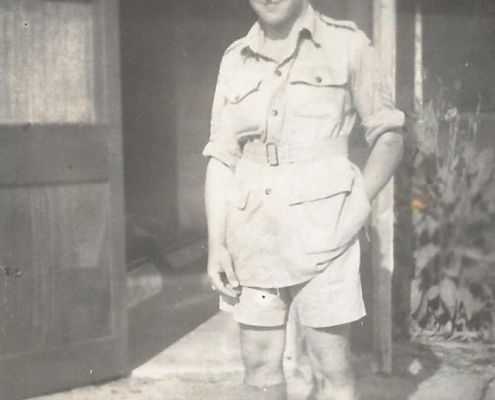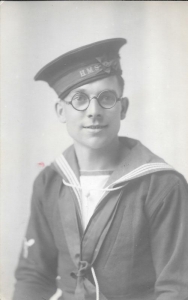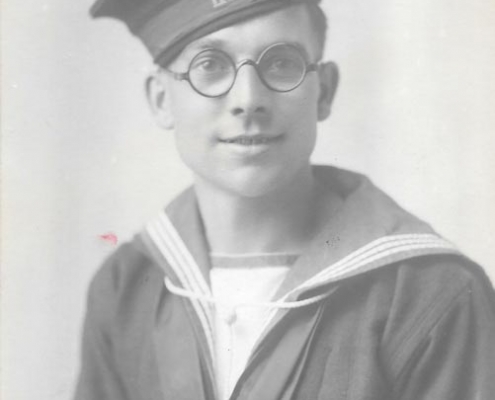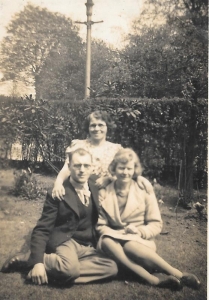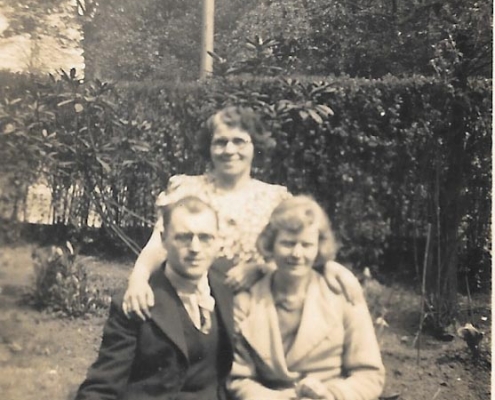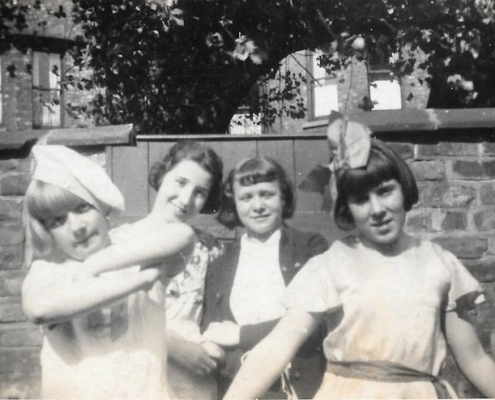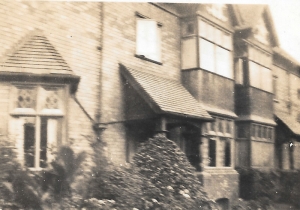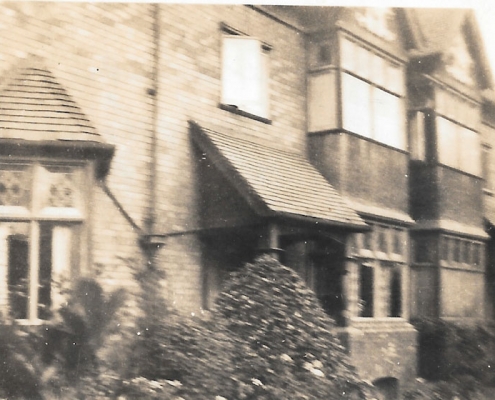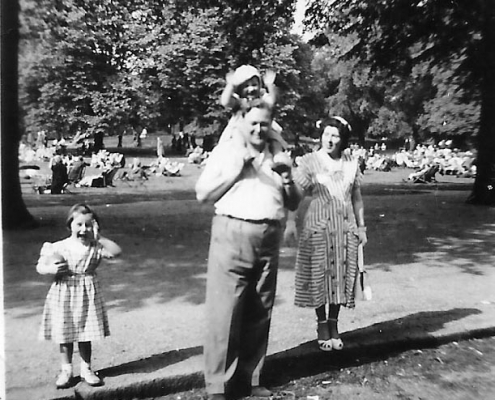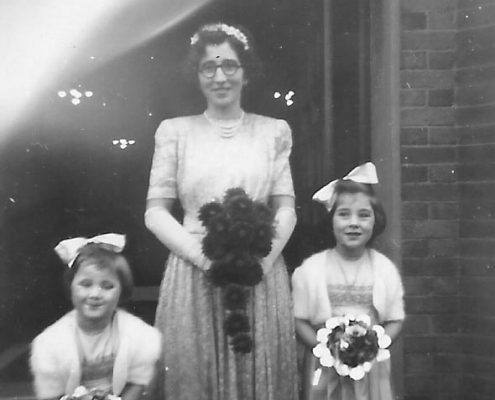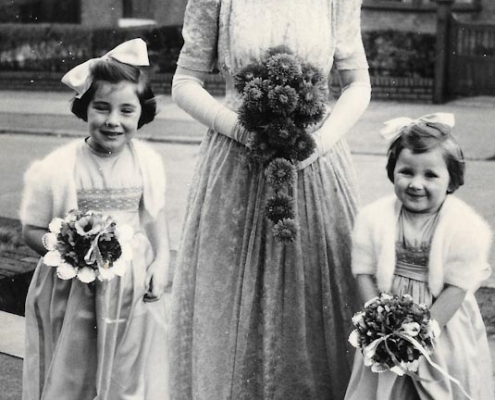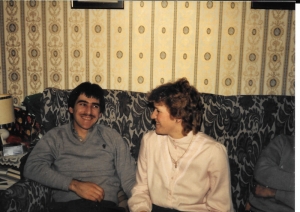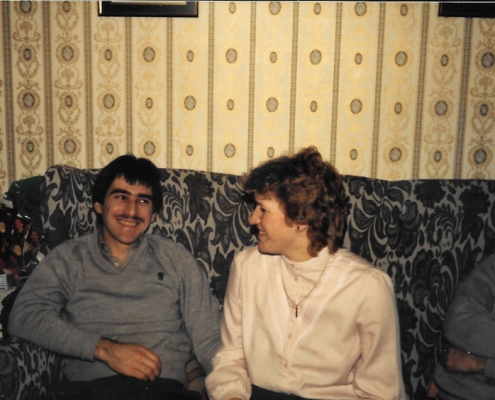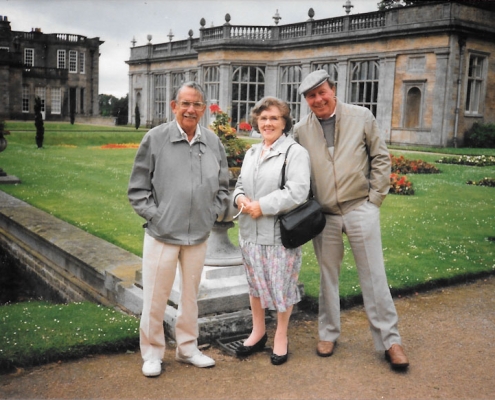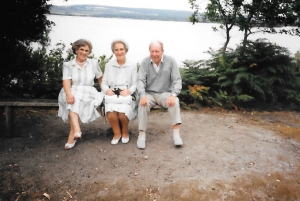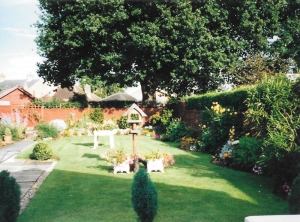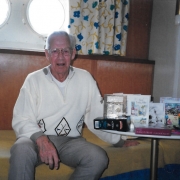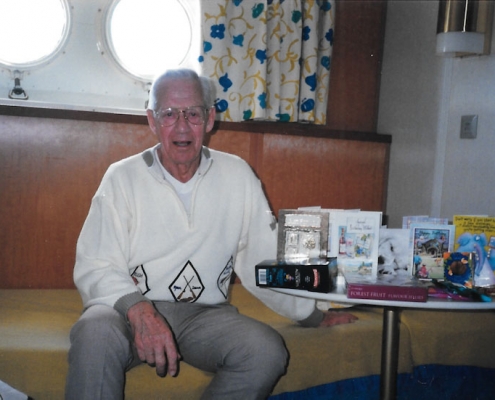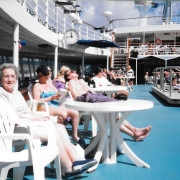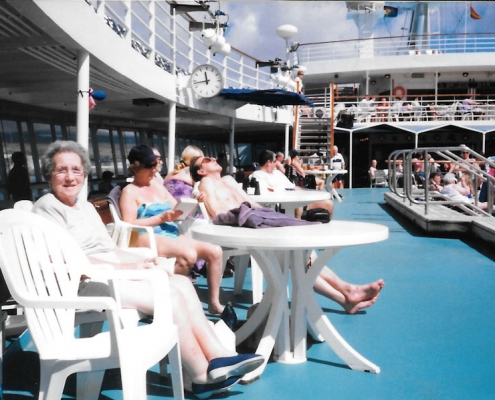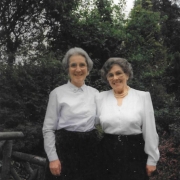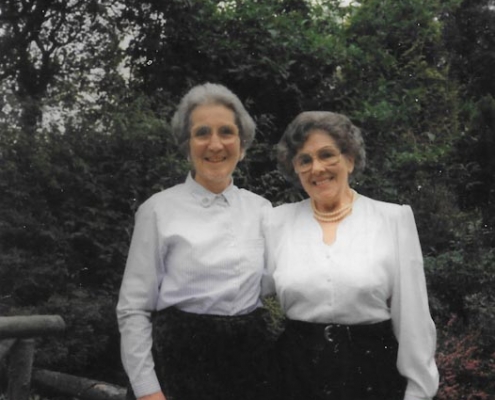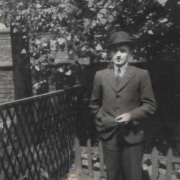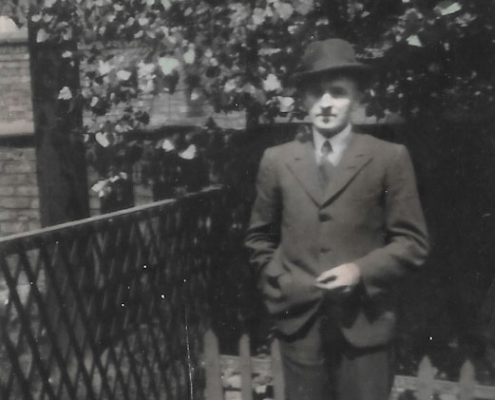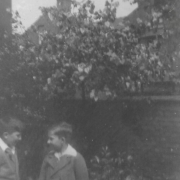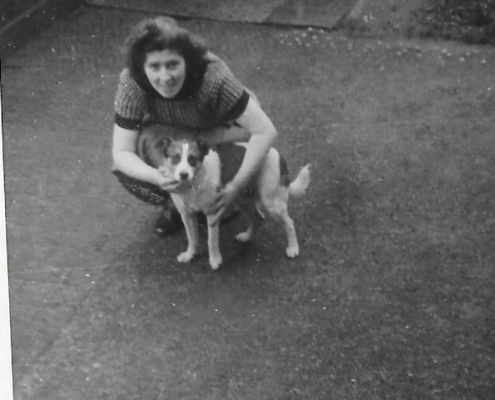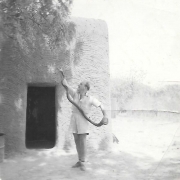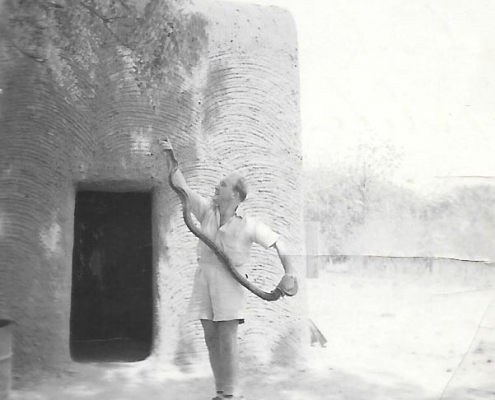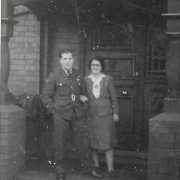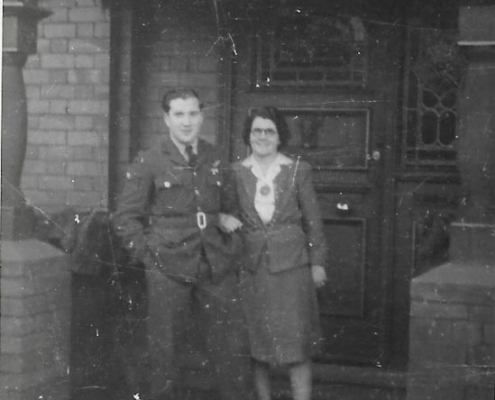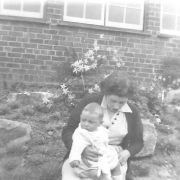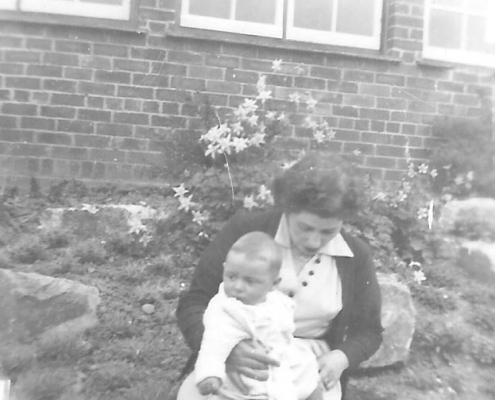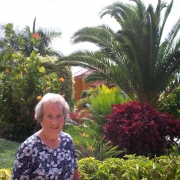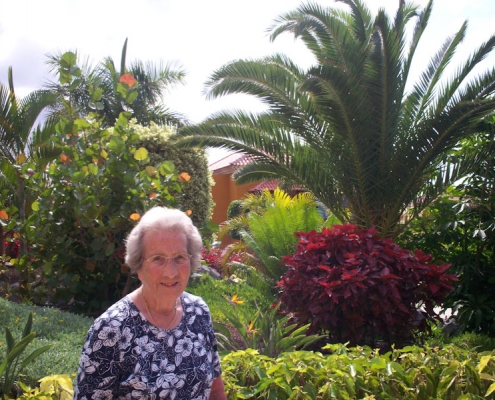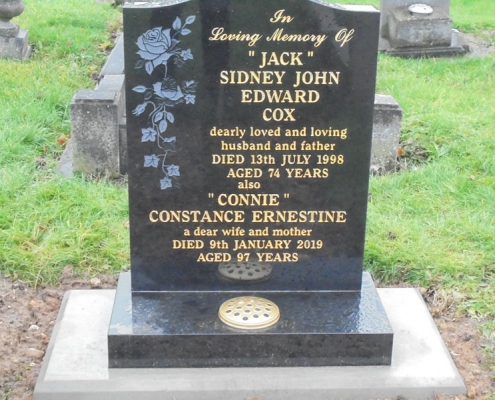Constance Ernestine Murray
September 12th 1921 – January 9th 2019
This is a short history of Connie’s life, written by herself some years ago. She then wrote a postscript some years later after her second husband John Cox died and some two years later she met and married John Tonks. These are her words.
Constance Ernestine Murray. Born 12th September 1921 at Louth, Lincolnshire England. Married Ronald Symon Tait on 6th June 1942. Was baptised on 27th August 1966 at 8pm by Wendell M Smoot 3rd.
Divorced Mr Tait in October 1973 and married Sidney John Edward Cox on 1st December 1973.
After almost 25 very happy years together, Mr Cox died suddenly on 13th July 1998. Known as Jack.
On 4th November 2000, I married John Thomas Tonks. We werewonderfully happy until his sudden death on 20th January 2003.
C. Tonks.
On 4th February 2016, myself (Paul Burnett, her nephew) and my wife Janet went to visit Connie at her home in Loughborough. I asked her if she could describe to me some of the events from her life which she readily agreed to and then with her permission, I recorded. My Auntie Connie was 95 years old at the time but still full of fun and life, although at times she struggled to recall details and became a little confused with certain names. You can listen to that discussion here below.
A Short History
Written by Connie Cox. 1999
Hope
“I’m afraid you have lost her this time.” Mrs Murray looked at the nurse, as they both stood in the best bedroom of the four-room cottage in Gospel Gate, Louth. Once again, I was able to give them hope, as I struggled for breath. I was hardly picked up and slept on my back to help the breathing.
At only six days old, I had caught Whooping Cough. Several times I had been thought to be dead when I stopped breathing, and my face turned blue, my dark hair clinging to my head with perspiration. I was very fortunate to get better, as there was an epidemic and people of all ages had died.
My mother told me she was overjoyed that I survived. She had had three sons in a previous marriage. Her first husband, Alan Robertson had died of pneumonia, leaving her with three baby sons under five years old.
Mum whose name was Constance Margaret, met Dad, Ernest John, when she was out with her cousin Aggie. They stood watching Dad tending some horses in a field. When he came through the gate, they started talking. Mum recalls that he was very handsome, with dark wavy hair and blue eyes. Straightaway they both had something in common, as they both originated in London.
After a short romance, they married and I was born nine months later, on 12th of September 1921. I was christened Constance after Mum, and Earnestine after Dad. My three half-brothers were Douglas William born in 1914, Lionel Oliver born 1916 and Guy Morris born in 1918.
Constance & Ernest Murray. Connie’s Mother & Father. Later years, Connie’s mum enjoying the sunshine in Clacton.
Down but Not Out
Left to Right.
Joyce Eileen, born 1st March 1923. Hubert Edwin, born 2nd September 1925.
Gordon William, born 20th April 1927.
I have no idea how long we lived in the house where I was born, but when I was seven, we had been living with Grandma Hopper at 8 Spring Side, another four groomed cottage, for some time.
Joyce Eileen, my sister arrived on 1st March 1923. Hubert Edwin born on 2nd September at Hull, Bradford in 1925. Gordon William born on 20th April 1927 and was born at Grandmas’ cottage. I can remember quite clearly, going upstairs to see my new baby brother, nestling in my mother’s arms.
Times were very hard in those days. There was a sink in the kitchen, but the taps were outside in the yard, which served six cottages. Each cottage had its own toilet which had a large wooden seat and which fitted the width of the little room, which was at the bottom of the garden. The seat was well scrubbed always beautifully white. We had not heard of toilet paper then. We used newspaper cut into pieces and threaded on a string then hung on the nail on the wall.
All the cooking was done at the kitchen fire range. It was always a black leaded, and the steel parts shone like silver. I really smell rabbit stew now, but the succulent smell always made us ready to eat and wipe up the gravy with our bread.
Wash day was always a long tiring day. In the corner of the kitchen was a large brick-built boiler. It was shaped like a very large teacup with a space under it for hot coals to keep burning and boil the water which would wash the clothes. Mum or Grandma would put each cotton article on the rubbing board, a piece of corrugated metal in a wooden frame. Item would be rubbed with a large square of sunlight soap then scrubbed, put back into the boiler and then allowed to boil. Rinsing in the sink must have been difficult as every bucket of water had to be carried from the yard. Then came the wringing of the clothes through the mangle to get out as much water as possible. The mangle had a large iron frame, large wooden rollers and a large handle that had to be turned when the clothes were fed into the rollers. Buttons had to be carefully arranged, so they would not break when being squeezed through.
I was about six years old, when I tried to help. I put my fingers too far in and had several of them ’mangled.’ My screams soon brought Dad to the scene, and he sucked my fingers into shape again.
If the weather was wet, drying the washing was not easy, but was something we were used to and thought nothing of. Most of it was put on the pulley, which was four lengths of wood which fitted into an iron frame at each end. It was pulled up to the ceiling by pulley and the rope fastened to the wall. Any other clothes went on the ‘horse’ round the fire.
Friday was always ‘bath night.’ A large zinc bath hung on the nail on an outhouse wall. That was brought in and put in front of the fire. Water was heated in the wash boiler, then bucketed into the bath. Mum bathed each of us in turn, the youngest first, more hot water was added as needed. Dad sat on the scrubbed top of the kitchen table and dried us. Then each of us was given a spoonful of ‘syrup of figs.’
At this time, Douglas was in Dr Barnardo’s Home, but Lionel and Guy lived with us. They slept in the back bedroom with Grandma, while Joyce, Bert and I slept on a mattress on top of the table in the front room downstairs.
As children, we enjoyed our walks to the Hubbards Hills and the fun we had there. We collected beautiful, coloured leaves in the autumn, also small hazelnuts. We also had a good time scrambling over the pens at the cattle market.
Constance had three children by her first marriage to Alan Robertson who died of Pneumonia. Lionel (Left), Douglas (Right) and Guy (No picture).
I used to feel very sorry for a lady who is sometimes came along to Springside. She had no legs and propelled herself along on a small platform which was attached to 4 little wheels.
Still Harder Times.
When I was seven, Dad got a new job, so he said ‘goodbye’ to Grandma and Lionel and Guy and went to live in Walsall. We had a nice three bedroomed house and a little garden. The houses opposite bordered fields and a river. One year we had an invasion of frogs, large and small, croaking everywhere. Being the eldest, I had to look after Joyce, Bert, and Gordon. With my new friend Molly, we spent a lot of time over the fields. We did a lot of fishing and filled our jam jars with Sticklebacks, Bloodsuckers, and Frogs. We also collected tall grasses, plaited them onto a cardboard sole and made slippers. I can never remember wearing any of them, but the intention was there. Molly‘s parents had converted the front room of the house into a grocery shop. I remember once Mrs Booker said to me “would you like to help me make some ice cream?“ I went into the kitchen where I saw a wooden tub with a lid, and a handle which I was told to turn. It was hard work, but I managed it for a while. Cornets in those days cost 1/2d, 1d or 2d.
Times were not easy for Mum and Dad, but the 2/6d Mum earned each week for doing Mrs Vipond’s weekly washing and ironing was a great help, Mrs Booker was very good to us too. She gave us groceries when Dad was out of work, and sometimes she passed on her two daughters clothes to us. I can remember mostly navy-blue knickers and liberty bodices. The bodices were like fleecy lined waistcoats that were worn over the vest.
Connie (Back Left) Friends Hilda and Bella with Joyce (Front Right).
There were a lot of people out of work in the 1920’s. Lots of starvation, queues for free soup, queues for dole money and that was just a few shillings for a man and his family.
We children were happy enough. We were well fed on bread and dripping which we loved or bread and jam or fried bread. Fat was never cut off and thrown away then but was rendered down until it could be used for frying.
As I got older, about nine, I enjoyed going to the market. One stall-holder sticks in my mind. I remember his words “Too late, too late, will be the cry, the man with the perfume has passed you by.”
There was very little traffic then, so we played ‘hide and seek’ in the streets. We all enjoyed doing handstands up Mrs Vipond’s wall. Whenever I smell flowering privet I am reminded of the handstands, because Mrs Vipond’s privet towered above the wall, and it smelt beautiful.
My brother Bert wanted a dog, so one night, in his prayers, he asked Jesus to send him one. What a surprise Mum had when she opened the door to bring in the milk. There in the front garden was a dog. It was a Brindle Bull Terrier but was so thin, all its ribs were poking through. There was great excitement when Bert heard about it. “It’s my dog. Jesus sent it for me,“ he cried. Mum and Dad were not sure what to do, as it was another mouth to feed. However, Mum gave the dog some bread. Bert wanted to stay home with his new found friend. It was decided that we should all go to school, and if the animal were still here when we got back, it could stay.
That was probably the longest school day of Bert ‘s life. The next job was to give the dog a name. We were all in the kitchen calling names, but he took no notice until someone said ‘John’ then he looked up. So that is who he became. The name means ‘A Gift of God.’ He was a good dog and lived with us until he was very old.
I was watching Mum one day, when she put the blanket and sheet on the table ready for ironing. Saucer turned upside down was on the table to stand the hot iron on. We had two flat irons. One would be heating on a trivet, close up to the bars of the fire while the other was being used. This day, Mum was pressing Dads suit as he was going for a job interview. She damped a clean piece of cloth with vinegar and rubbed the suit with it. “Why are you doing that Mummy”? “Daddy will smell like a fish and chip shop”. “Daddy’s suit is quite old, and the vinegar will take some of the shine away. The smell will soon disappear,” she said.
About this time, I earned 6d a week for taking a neighbour’s baby out in his pram, when I came home from school at lunchtime. He was quite a small baby, and sometimes I would take his hat off because I thought he looked better without it. I would put it on him again before I took him home. I have often thought how naughty I was, for he might have caught cold.
When I was 11, I was offered a place at the Edward Shelley Central School. For this I had to wear a uniform. A long-sleeved blouse with thin blue and white stripes, and navy, maroon and gold striped tie, and navy gymslip. I was always a bit embarrassed by my gymslip, as being cheap, it would never hold its pleats. I was not happy learning French and some of the other subjects were difficult for me, but I loved algebra and cookery. On my school report, the domestic science teacher said ‘Good. Gets ahead with her work.’ Three months after starting there I had to leave, as Dad got a job that took us to Manchester.
The War Years
We settled in a nice three bedroomed house in Old Trafford, not far from Brooks Bar. I started school at Old Trafford Senior Girls and left when I was 14. In the final year I was in the commercial class where I learnt bookkeeping and shorthand. Miss Reid was a nice teacher although she looked old to me. I am sure she was not, but she was dark over her top lip as though she had a moustache, and her hair was in coils over her ears.
The Family Home. Ashburton Road.
I got a job in December at the Skefko Ball Bearing Company in Trafford Park as an ‘office girl’. That meant I had to look for files and take messages to other offices. Later on, I was given a typewriter and was able to practice. I remember that first day. Mum gave me one of her dresses to wear for the office as she thought it was more suitable. It was chocolate brown crepe with long sleeves and a Jabot down the front. It was quite ugly. I started going to evening classes where I learnt bookkeeping, shorthand and typing. It was there that I met Tom and went out with him for a few months. During the next year or two I had several boyfriends. Once I went out with three brothers at different times. My sister Joyce and I enjoyed going dancing and went there three or four times a week.
The war broke out a few days before my 18th birthday. I was now in the drawing office where I had been taught tracing. I enjoyed it very much.
With some friends from the office and a police inspector, I went on ARP duty. We had a large, corrugated building where there were cooking facilities, beds, and telephones. I was lucky when I was there as there was never any trouble to phone about. We enjoyed the cooking and eating together. I also had my first cigarette but decided to never have another as I did not like the taste.
I have some favourite dancing partners. When I got home, I would tell Mum “I danced with clean washing,” so named because he always smelt so fresh and clean. Another favourite was the Austrian who was in the army and training to be a dentist. He was dark and good-looking and always clicked his heels and bowed his head when he came to ask me to dance and sometimes as we danced to the tune ‘Ramona’ he sang the words. It was this same dance hall that I met Ronald Tait, my future husband. The dance was the ladies ‘excuse me’. I thought he looked rather nice, so I ‘excused him.’
He asked to take me home, and after that, on 21st of April 1941 we started going out together. It was Princess Elizabeth’s (now our queen) 14th birthday. I decided after a while to end our friendship. Ron however did not want it to end and would send notes to say he would be in a certain place at a certain time. Mum and Dad told me they had seen him waiting. Eventually, I gave in and started going out with him again. We fell in love and on 3rd of January 1942 he bought me a diamond engagement ring. I think it was when I stopped seeing him that he joined the RAF. At one time he was stationed at the Tower Ballroom in Blackpool. Then he was transferred to Taunton. He used to hitchhike all that way to spend the weekend with me in Manchester.
We were married on sixth of June 1942 at the Presbyterian Church on Northenden Road in Sale. I was married in a white satin dress and had three bridesmaids dressed in pale mauve. They were Joyce and two friends. Ron wore his uniform. Dad paid for a very nice reception for us at the local restaurant. We spent our honeymoon at Harlech in North Wales but stayed the first night at the Swan Hotel in Chester. I wish we had spent more time there; it looks an interesting place.
Six weeks later my new husband was sent to the middle east. I did not see him again for three years. We wrote to each other daily, posting the letters each week, and in between we sent air letters. The European war ended in May 1945 and Ron arrived home in July.
Connie & Ron’s Wedding Day. 6th June 1942. Presbyterian Church, Northenden Road, Sale.
During the war I lived with the family. When the sirens sounded for an air raid, we all went down in the cellar. Mum had made it as comfortable as possible for us, so we were able to sleep down there.
One night, two incendiaries (firebombs) landed on our house. One in the gutter of the bathroom and the other at the foot of the bed, where Mum had put a parcel of new blankets. Dad told us to get buckets of earth to throw on the fires. Not being able to see in the dark, we brought in buckets of soot. The chimneys had been swept that week and the soot was not taken away as it is now.
Dad always said, “If a bomb has got your number on, you’ll get it.” When he looked at the shells, he found that one did have our number on it. 83-1-2. Our house was 83 and we had the two bombs. I think it was 1941 when the bombing around us was very bad. Landmines were dropped further down the road. All our windows were blown out, but still remember Mum playing the piano, and the family singing around it. It was about this time that Mum and Dad decided to leave Old Trafford, and we moved into a lovely house in Derbyshire Road, Sale.
Married Life in Peacetime
When Ron came home after the war, we had two weeks holiday and then went to Glasgow to live. We got a bedsitting room in Ibrox, just round the corner from the football stadium. I went with Ron lots of times to see the football matches. I saw the Russians play at Hampden Park.
After about a year, Ron got a job with Babcock and Wilcox, working in the office. It was another year before Rosalie was born. She arrived on 29th October 1947 at the nursing home in Strathbungo. She was beautiful and had thick dark hair. The nurses called her “Topsy Tait.”
By this time, we had moved house. We now had a small back bedroom to live in. It was very cramped, but the owners were very kind and helpful. Ron used to get grumpy when the baby cried, so very often I took her out in the pram at weekends when he was home.
Our next move was to a flat on the main road, opposite the Bellahauston Academy. It was good to have room to move about. Rosalie was about 12 months old now, and I remember how lovely she looked in a velour coat, leggings, and bonnet in a soft shade of pink.
We had our name down for a council house, but one never seemed to come our way. I don’t know why we thought it might be easier to get decent place to live in London. Auntie Beat was living in an upstairs flat in a house in Walthamstow when she offered us temporary accommodation with her until we got something. We were delighted and were soon on our way. I realised at this time that I might be pregnant again but I did not tell Auntie Beat right away.
Ron went out most nights after work to try to find rooms for us, and often was not back until 10 o’clock. I’m afraid Auntie Beat thought he was not trying, but we definitely wanted to get our own place.
One morning we had a big row and she told us to leave. It was very sad really as she was so kind when we went and bought us a lovely pushchair for Rosalie. However, it was impossible for me to get accommodation for us all. Ron got a room for himself; it was easier for people who were at work all day. Rosalie and I went to my parents in Manchester. By now, they had a newspaper business in Prestwich. Gordon and Joyce both worked for them.
By the time that I was eight months pregnant, Mum and Dad began to think the same as Auntie Beat, that Ron was not trying to find anything. Mum said “If you go back, he will have to do something.” So back we went and the only place we could get to sleep was a church army hostel. We had a comfortable bed and a good breakfast, then we had to be out all day. Ron was still working at the office where he had been transferred from Glasgow, and he was still at the same lodgings. Rosalie and I spent a lot of time in Hyde Park when we were not looking for rooms. I was very glad of the pushchair. When I knocked on a door where a room was advertised I usually got the same answer. “I am sorry, it has just been taken, or it is only suitable for business people.” We were lucky in one respect; the weather was lovely that August.
After a couple of weeks of being in the hostel, Ron got in touch with one of his RAF friends. Johnny Springall was married and lived with his wife Dorothy and little girl Jill, in a bungalow in Ruislip.
We met and they very kindly agreed to let us stay with them until I went into hospital to have the baby. In the meantime, we had to make arrangements to have Rosalie looked after when I was in hospital.
About a month before the birth we went on a bus to Henley on Thames to a children’s home where Rosalie was to stay. I was in floods of tears all the way. I shall never forget the misery and unhappiness I felt. The people of the home were very kind. They took my babies hand and led her away. I was in too much of a sad state to even say goodbye to her. I was glad Ron was able to visit her.
Sheila was born on 29th of September 1949 at Saint Mary’s hospital, Paddington. She was a lovely big baby with light hair and blue eyes, and weighed 8 lb 12 oz. While I was at the hospital I had to explain to the Almoner that I had nowhere to take my baby when the time came to leave. She very kindly arranged for us to go and stay with Miss Stevens who ran a rest home at Welling Garden City. I was very happy there and when I told her about Rosalie being in the home, she said Rosalie could stay with us too. I can remember the joy when Ron brought her to us and showing her, her new baby sister. When Rosalie was two on 29th of October, Miss Stevens made her an iced birthday cake. It was a very happy time
Ron with Rosalie, Sheila & Joyce in Hyde Park.
The Bridesmaids. Connie, Rosalie & Sheila on Joyce’s Wedding Day.
We knew we could not stay there much longer and after being there for six weeks, Ron arranged with a friend he worked with, that we could have a room in his prefab. (A bungalow made of large pieces of prefabricated material and put together on site in a very short time. They were supposed to last for 10 years but some were still standing 20 and 30 years later.) The husband and wife were both at work and their two little girls at school so I had the house to myself all day which was very nice. One day I was not feeling very well so decided to take some Sal Volatile*. I had never had it before and did not understand the instructions and took a teaspoon full without water. I gasped for breath and really thought I was going to die. It was a dreadful few moments. We were at the prefab for six weeks when Ron was offered a flat by his firm.
*Spirit of Sal Volatile was a liquid ammonia solution, prescribed as an antispasmodic, stimulant and restorative. Although smelling salts were most frequently used to revive patients who had fainted, the liquid form was used to treat a variety of illnesses including fever, diarrhoea, fainting and coughs.
Our First Home
The flat was on the third floor of a block of houses on Marylebone Road, right opposite the Town Hall. We were so pleased to have a home of our own at last, even though there was no cooker and only cold water over a small sink on a landing a few steps down. There was also an attic room.
I cannot remember how we came to get furniture, but I think we had a double bed and single one in the bedroom. The living room was very big. I remember making a rag rug for in front of the fireplace. We had to get something to cook on, so we bought an oil stove. It stood on the floor and was about 18 inches high. Eventually, we bought a second one, and then a little oven to stand on top. I was then able to make cakes. I did my first wallpapering there. I got 10 rolls for 50p which was 10 shillings. Life that was not easy as I had to boil kettles of water to do the washing in. I had clothes lines in the attic to save me going down three flights to the garden.
Regularly I had to bring cans of oil home for the stove, then lug it upstairs with my shopping, the children and the pushchair. But they were happy times. I enjoyed going to the Church Street market which was off Edgeware Road. We went often to Regents Park, which was only a few minutes walk away. I have snaps of Ron taking Rosalie and Sheila when they were four and two, for a row on the lake. We also visited Regents Park Zoo more than once.
Without saying anything to me about his intentions, Ron took the girls out for a walk one Saturday and they came home with a new coats. Sheila’s was a fawn colour and Rosalie’s was red, they looked very nice, except that they were a bit long.
Gordon and Beryl visited us once and I must have salted the potatoes twice. It is quite a joke now for he is still reminds me of it.
The first school that Rosalie and Sheila went to was Saint Georges in Hanover Square. They both did well and had good school reports. It was quite away from home, but we always walked there.
We had been at Marylebone Road for about six years when I became pregnant. We knew it would be impossible to have a baby there and the council were not able to help us. However, Babcock and Wilcox, Ron’s firm came to our rescue again. They had a bungalow at Elstree which was in factory grounds and had been used as an office. We moved in early July 1956. The grounds around the bungalow were covered in cerise coloured wildflowers. Rosalie and Sheila picked bunches and bunches of it. All my vases and jam jars were filled with them. The bungalow had two bedrooms, a living room and a nice kitchen with a gas cooker and the sink. There must have been a bathroom and toilet too, but I cannot remember much about it. We had a key to open the big factory gates to get onto the street. We had no neighbours but that did not worry me. It was in Boreham Wood where I did the shopping and later joined the Baptist Church where I made some good friends. I am still in touch with Eileen Lidbetter and last year, Dorothy Paul spent a weekend with us.
The film studios were opposite us at Elstree. Sheila spent hours outside waiting for the stars to come through to get their autographs. I have now got the book she used. We did not have much in the way of furniture. I remember the table we had was big and had a scrubbed top which was covered by a thick tablecloth and it had dark polished legs. When I was out shopping, I saw a dining table and four chairs advertised for £5 so Ron and I decided to have it. We had no van to collect it in, so borrowed a hand cart from the factory. We were thrilled to bits to have it. It looked really good, it was a square table with leaves and the chairs were smart too after the plain wooden ones that we have been using.
We had to smile, but we were a bit embarrassed too when we went to a school open evening and read in Sheila’s diary “We have got a new table and chairs. Mummy and Daddy brought them home on a barrow.”
We also acquired a dog. Ron brought him home and called him ‘Corky’ after a footballer. He was a black and tan mongrel and we all loved him.
A Son.
Brian Michael was born at Edgeware hospital on sixth of November 1956 weighing 10 lb and 2 oz. He was a beautiful baby and I was very proud of him. I think Ron was rather pleased with him too. Rosalie and Sheila stayed with friends for two weeks at Mablethorpe at this time. Our friends had a boarding house, and we had several summer holidays with them. Their daughter Betty was a teacher, so the girls went to school with her. I have still got the lovely little letters they sent me.
Brian (Connie’s son) & Karen Christmas 1984
When Brian was about 18 months old, we decided to buy a house. We decided on one in Sundon Park, Luton. It was a nice three-bedroom house with a garden at the front and a good-sized garden at the back.
It was at this time that Ron wanted me to go back to work. I was not happy to do this as Brian was only about 18 months old. However I got a job, and my next door neighbour, who had two young children, looked after Brian for me.
Mum, who lived in Sale, Manchester with Lionel, was not happy with him, so Ron and I talked it over and decided to offer her a home with us. When she came, she was able to look after Brian.
Ron was often miserable, because he was short of money, although he was a member of a bowls club and travelled to see football and cricket.
I remember saying to Mum, especially at Christmas time, “Don’t say anything to Ron about money, it only makes him cross.” Somehow, he always managed to find some remark in the paper saying “people are spending more money than ever this Christmas.“
For the next six or seven years we had our ups and downs, not being very happy and Ron getting more bad tempered.
I enjoyed friendships at the Baptist Church, where I went regularly, and one day I was baptised. I sometimes did dressmaking for friends and attempted to make chair covers for the church lounge. I was not very happy with the result. Brian recently reminded me of that when he sent me a comic card of someone selling chair covers.
In February 1966 I was home for a few days with a bad cold. Mum told me she was expecting some Mormon missionaries to call and would like me to meet them.
The Church
After having many meetings and discussions with the missionaries, and reading the Book of Mormon, I became very interested. I met several young men during this time and sister missionaries too. It was not until I took their advice, and after reading the Book of Mormon, asked God if it was true, and I received a most ‘definite’ ‘yes’, it is true. The feeling in my heart was warm and loving, and I have no doubt that it was true. I can never change my mind now, I know without a doubt that the Book of Mormon is true, and the Church of Jesus Christ of Latter-Day Saints, is God’s true church on Earth.
Elder Smoot, who first talked to me about the church had finished his mission and gone home. Luckily for me, he had come back to London for a visit, and called on me as I was discussing a baptism date with the two Elders. I was happy that Elder Smoot was able to baptise me. After thirty years we still keep in touch. He is married to a lovely lady and has four sons. Three have been on missions, the fourth is still at college.
Ron did not mind me joining the church. I suppose he was not really interested. I often looked in shop windows for adverts advertising rooms to let, for if I found one, I had decided to leave Ron, and take Brian with me. He was always grumbling at Brian. If he shuffled his feet, whilst sitting on the floor, he would be shouted at. In June the following year, it was our Silver Wedding Anniversary. I gave Ron a card, but he didn’t give me one. Earlier, I had asked him if he would go on holiday, with Mum, Brian, and me. He said “No,“ so we went on holiday without him.
In the afternoon, after arriving, we went to a café. While Mum and I had drinks; Brian was enjoying himself on a slot machine. He seemed pretty lucky. He rushed up to us laughing every time he won. We were all laughing a lot and as I looked up, I saw Jack, who was sitting at a table nearby, and he was laughing with us too. We soon got talking and spent the rest of our week together. His wife Cathy had died of cancer in September the year before. He told me how much they loved each other. His son Barry lived with him and Barry‘s wife Wendy. They were very young and had a baby son Barry, a few months old. Since Cathy died, Jack’s mother lived with them too.
On Tuesday evening after our first kiss, we both knew that it was serious. Before the end of the week, we were both in love.
Jack, stood with Eric & Joyce on one of our day’s out.
I told Jack about Ron and said I would get a divorce. We wrote to each other often and phoned whenever we could. I was always thrilled to hear Jack’s voice on the phone. Occasionally, when Ron was away at a football match, Jack, Brian, and I met in London. We were so happy to be together. I have still got the letters we wrote to each other. They are a true love story. Through friends of Jack, I was able to get a job as cook at an old peoples nursing home in Englefield Green, a little village outside Egham where Jack lived.
Ron was often telling me he would be glad if I left him, so I did just that. I should have told him really, but I just left a note. Even though he didn’t love me and told me he hated me, he must have been a bit hurt.
I settled into my job, and Brian into his new school, and we were very happy. It was wonderful to see Jack every evening and weekend, and our love grew stronger. It was 1st of December 1973 before Jack and I were able to marry, as Ron was against the divorce. Rosalie and Pete were married three years before, so Zoe came to my wedding as a baby. At about the same time I met Jack, Sheila wanted to marry Rick. Ron and I said that she could, but she was only 18. The marriage lasted five years. I regret not spending more time with Sheila then, I might have been able to help her.
I am more than glad, that Rosalie and Pete are very happy, and Brian and Karen too. It was a very sad day for us all when Sheila died of cancer on 19th of April 1992. She was married to Robert Clark and left behind Frank who was 10 years old and Fay who was eight. It is strange that 12 months before, her first husband Rick, died in an accident.
Jack and I had some wonderful holidays together, from Newlyn where Jack lived as a child, visits and holidays in Wales, Yorkshire, Devon and Somerset, the Isle of Wight and Scotland, the Lake District and Louth where I was born. We often had days out when we lived in Blandford and went to Poole, Bournemouth, Christchurch, Weymouth, Swanage, Portland, Bridport, and lots of other places. We sometimes had a meal with our friends Gladys and Len at the Red Rose restaurant at Sturminster Newton.
Our first holiday abroad together was at Kekana, the island of 1000 Palm Trees, in the Mediterranean and a short distance from Tunis which we visited. We have also been to Crete, and several times to the old Yugoslavia, which we thought was very beautiful, Spain and Majorca and Tenerife, all more than once. I have photographs of Jack in all of these places.
We each had our own hobbies. Jack’s main one was gardening. Our garden was always very colourful and well cared for. It was the envy of our friends and neighbours, but Jack was always willing to give away some of his favourite flowers, fuchsias, and dahlias to anyone who admired them. He has even given them to strangers. Jack also enjoyed going to the snooker and had some good friends there. He was chairman for the last few years. I know that he is sadly missed there.
I enjoyed going to as many church activities as I could, and sometimes Jack went with me. We both had good friends amongst the members and often met socially. One of my hobbies was helping at Oxfam. I was with them for 10 years and went every Monday morning. During the last year at Blandford, I gave up Oxfam and helped in the local hospital. I enjoyed being on the wards.
Jack used to say he hated doing the local shopping, it was the waiting around he didn’t like, but we always went together and enjoyed the togetherness.
On Friday evenings we went to the whist drive held at Ryan Court, which are flats for the elderly. We made several good friends there. Jack and I were never bored and enjoyed our life together. We visited our children, grandchildren and great crowds grandchildren quite often. I shall miss seeing some of them now. It is more difficult for me as I do not drive.
Now I am on my own, thinking of all the happy times Jack I had together. Sadly, he died suddenly on 13th of July 1998. It is December now. For a few weeks Jack had not been feeling well, he could not remember so well, and it worried him. On the morning of the 13th we had visited the Doctor Who told him to have a blood test. As we came out of the surgery Jack collapsed. He was rushed to the hospital but there was nothing they could do. He had suffered an aortic aneurysm. It was a terrible shock to me; it was hard to believe he was gone.
Joyce, Connie & Jack Cox. Brownsea Island 1994
I have gone through with the selling of the house as we planned to do, and moved to this bungalow, which we both liked, and it is only a few miles from Rosalie. I am as happy as I can be without Jack. I know I should be far less happy, if I did not know, that one day, in the not too distant future, Jack and I will be together, to love each other for all eternity.
The Bungalow Back Garden
Through joining the Church of Jesus Christ of Latter-Day Saints, I have got peace of mind. I know that God lives, but Jesus Christ died for me. Because I believe in Him, all my sins are forgiven. As he rose after death, so we shall all, and we will be reunited with our loved ones. What an experience it will be! I shall be waiting to welcome all my loved ones, who are still on Earth when I go.
True love is wonderful, and a great joy.
Written by Connie Cox. 1999
The Years 1998 to 2003
My Auntie Connie completed her story up to the year 1999. Unfortunately, after very nearly 25 years of happy marriage, Jack died suddenly on 13th July 1998.
However, this was not to be the end of Connie’s story as some time later she met and later married John Thomas Tonks on 4th November 2000. I know they were both very happy until once again, Connie found herself grieving when John also died suddenly on 20th January 2003.
I know that Connie was a huge influence and comfort to my own mother Joyce, who lost her husband Eric on 8th May 2002. My mum found life extremely difficult without Eric but Connie, my mum’s sister, made regular telephone calls and visits. Sometimes Connie would come to Hazel Grove to stay with my mum for a few days and on other occasions I or Michelle, my sister would take mum to stay with Connie in Loughborough. They were very close and obviously enjoyed each other’s company very much. When together you couldn’t help but notice how happy they were, constantly laughing and giggling. I would have loved to be a ‘fly on the wall’ listening to some of their secrets when they were alone. I suspect during those times they became little girls again.
Rosalie and Pete were especially kind as they offered to take both sisters on holiday with them on at least one occasion I remember, which I know my mum enjoyed immensely.
Joyce passed away on 13th June 2009 and Connie on 9th January 2019. I am absolutely convinced that they both continue to laugh and giggle as they look down on us from that heavenly place.

